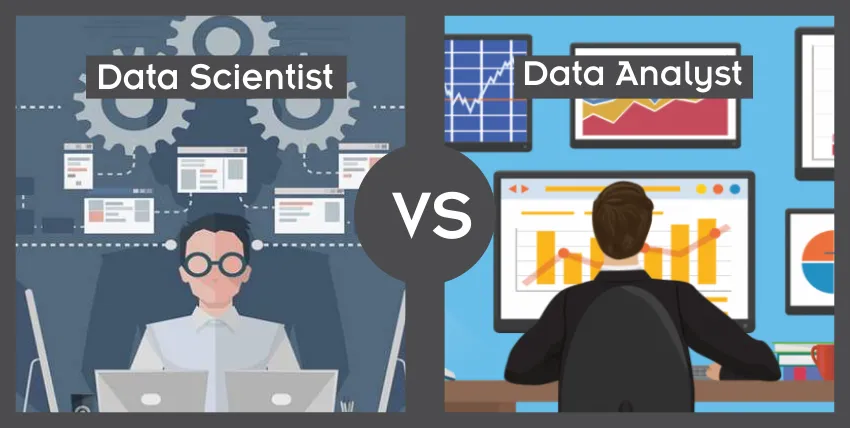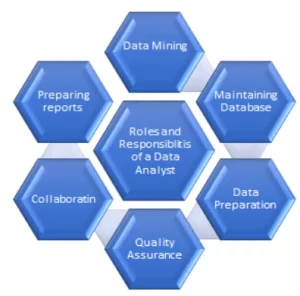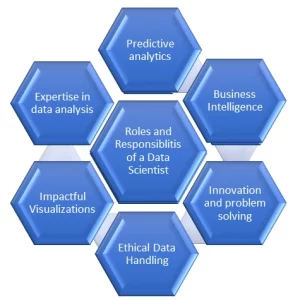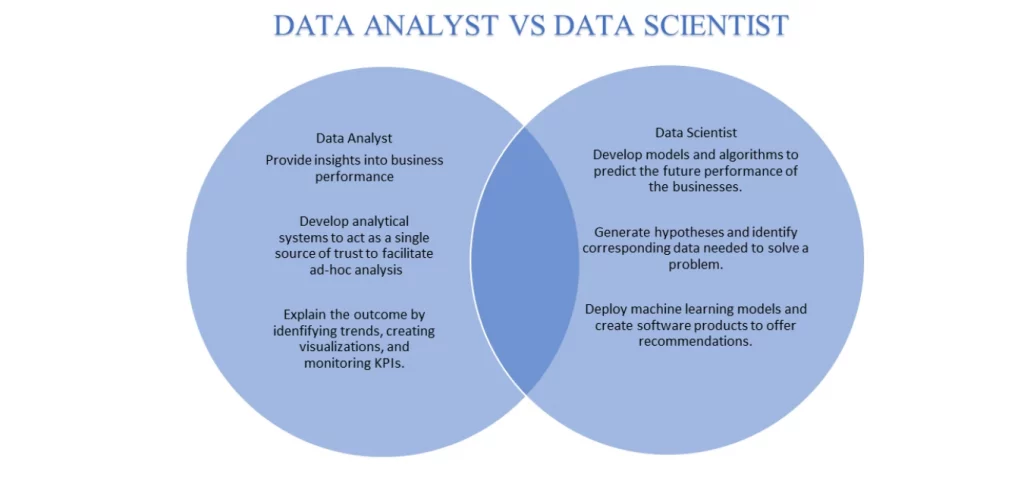
It’s 2025, and the world is moving very fast towards automation, where data, microchips are key factors controlling growth and opportunities. The two career choices which is drawing attention at a faster pace globally are the profiles of Data Analyst and Data Scientist. Differences which are similar at the same time in the roles of both data analyst and data scientist, often makes it confusing for beginners to distinguish between them. However, both roles have very different duties, skill sets required, and overall impact on an organization. In this blog, we will analyse the difference between data science vs data analytics, highlight the difference between a data analyst by comparing both profiles, that of data analyst vs data scientist, and discuss which path may suit you best if you are looking to build a career in data.
By the end of this blog, you will have absolute clarity about the “data analyst vs data scientist” debate and the distinct value that each role brings to the table.
The Big Picture: Why We Need to Know About These Roles
Now, before exploring the distinction between data analyst vs data scientist, let us take a closer look at how and why these roles came into existence.
The discussion on data analyst vs data scientist generates the most curiosity in the minds of aspiring candidates as well as employers. While both jobs are important, you can’t help but notice the fact that data science and data analysis are different. Radar analysts tell us with certainty “what happened,” while scientists concentrate on “what will happen” through sophisticated prediction.
Understanding the Landscape: Why These Roles Matter
Data analysts and data scientists are two different job roles that are important in a business context. Every company in the world has a data dump each day, with no clue what to do with it. Data capture and storage have no value until data is processed and interpreted in a way that loses no value. Data Analysts examine what has happened during the data capture time and what the data is in the formative stages.
Data Analysts make sense of historical and current data. They convert raw numbers into a form that can guide immediate business decisions.
Data Scientists, go further and combine mathematics, computer science, and AI to predict future trends, create machine learning models, and help organizations innovate using advanced algorithms.
The difference between data analyst and vs data scientist is like the difference between interpreting the score of a cricket match and predicting the result of an entire tournament. One emphasis is on explaining what happened, while the other is on what’s likely to happen next.
Principal functions of a data analyst
If you are to understand in layman’s language, then the role of a data analyst generally is to provide inputs on what happened and why. Let us walk through the comparison between the two roles.
It primarily includes cleaning and processing of data accurately, along with other activities like running queries on SQL, understanding data trends, and creating dashboards using Excel, Power BI, Google Sheets, and Tableau.

A business analyst may evaluate operational KPIs, while a financial analyst may detect patterns in financial markets.
Moreover, industries like healthcare, telecom, and IT count substantially on data analysts for strategic business decisions.
Principal functions of a Data Scientist:
The other end of the spectrum, when comparing data analysts vs. data scientists, is the digital data scientist.

- Data scientists apply statistics in conjunction with programming with the aim of working on either structured or unstructured data.
- A typical data scientist will create and develop predictive and prescriptive models and different algorithms on Python, R, or even Scala.
- Interacts with data on Big Data tools like Spark or Hadoop, or other data tools on the cloud.
- Applies different machine learning algorithms to problem data sets to predict the outcomes of the data sets.
- Simplifies futuristic data in more understandable ways using data visualization and reporting tools.
Skills: Data Analyst vs Data Scientist
Skill set is also a major difference between a data analyst and a data scientist.
Apart from technical expertise, a thorough knowledge of descriptive statistics and Effective Communication skills are essential for a data analyst role, as they often explain findings to non-technical teams.

On the other hand, advanced programming Skills and machine learning are preferred skills for Data Scientists. Deep statistical understanding, experience in handling unstructured data, and cloud computing skills are also required.
So, if you are yet to decide which way, do remember that the difference between data science and data analytics lies in complexity, depth, and technical proficiency. Analysts focus on describing, while scientists focus on predicting and prescribing.
Salary Comparison – Data Analyst vs Data Scientist
Another compelling aspect is compensation. If you compare a data analyst vs data scientist, salary often becomes a decisive factor.
Data Analysts earn decent salaries, particularly for entry to mid-level professionals. With 2–5 years of experience, analysts can command strong pay depending on the industry.
In the data domain, it’s the Data Scientists who are highly paid. Due to their technical qualifications and expertise, they are most preferred workforce by companies that pay premium packages for their retention.

The compelling aspect is compensation. If you compare a data analyst Vs data scientist, salary often becomes a decisive factor.
Data Analysts earn decent salaries, particularly for entry to mid-level professionals. With 2–5 years of experience, analysts can command strong pay depending on the industry.
In the data domain, it’s the Data Scientists who are highly paid. Due to their technical qualifications and experience, they are ost preferred workforce by Companies that pay premium packages for their retention.
Career perspective: what to opt for?
If one has to choose between a profile of a data analyst vs data scientist, it is highly advisable and recommended to look for future and long-term growth prospects.
As a Data Analyst, one gets the profile of Business Analyst, Senior Analyst, or Analytics Manager. Many analysts upgrade to data science by upskilling their expertise and qualifications.
The career progression of a Data Scientist keeps cruising with roles senior data scientist, Machine Learning Engineer, or Chief Data Officer.
This diversity between the roles impacts their career paths: analysts often progress into managerial roles within business domains, while scientists pursue more specialized paths in research, innovation, and technical leadership.
Qualification roadmap – Data Analyst vs Data Scientist
Qualification requisites for these career options also emphasize the key difference between a data analyst and a data scientist.
A Data Analyst career option demands an educational foundation as a bachelor’s degree in business, statistics, economics, or computer science. Additional certifications in analytics tools and SQL add value to your profile. Although there are various platforms, institutes that provide training and certification courses, Henry Harvin tops the chart as a versatile and globally accredited online learning platform for Certification Courses in Data Science and Data Analytics, along with 1200 plus Options to choose from. The institute offers live interactive sessions, placement assistance, global affiliations and accreditations, placement assistance, hands-on training, cloud labs, and imparts the best courses to reshape and mould one’s future.
Profile of a Data Scientist requires a stronger academic background, like a master’s or PhD in statistics, computer science, or data science, with expertise in machine learning, artificial intelligence, or big data analytics imparts candidates an edge.
Henceforth, it’s evident that the difference between data science and data analytics becomes evident: one relies on foundational skills and business acumen, while the other demands advanced technical mastery.
Similarities Between Data Analysts and Data Scientists
While we focus heavily on the difference between a data analyst and a data scientist, it’s equally important to acknowledge the similarities.
Both professionals:
• Collaborate with data for effective decision-making.
• Team up with business teams and stakeholders.
• Demand strong communication and storytelling abilities.
• plays a central role in a company’s success.
The difference between data science and data analytics is what shapes their level of impact and scope of responsibilities.
Choice of career
This choice is entirely based on one’s qualifications, skills, and career goals.
Opt for the profile of a data analyst if :
- You enjoy working with structured data.
- You prefer generating reports, dashboards, and visual insights.
- You want quicker entry into the workforce.
Embrace the profile of a data scientist if:
You love statistical modeling, machine learning, and programming.
You want to predict future business trends.
You are interested in advanced technical and research work.
Finally, after comparing both profiles, you can now decide the preferred career option that matches your personal interests as well as what you bring to the table.
Conclusion
The comparison analysis of both profiles, data analyst vs data scientist, sparks curiosity among aspiring professionals and employers alike. Although both roles are vital, the difference between data science and data analytics can’t be ignored. Analysts explain “what happened” with clarity, while scientists focus on “what will happen” through advanced predictive techniques.
The profession of Data Analyst is the ideal career option if working with data brings you joy. To be an outstanding and successful data analyst, it is highly recommended to hone your analytical and problem-solving skills.
Correspondingly, in case you have a passion for uncovering data insights, if you have expertise in core programming skills, and if developing new solutions to complex business problems excites you, then go ahead with the data science profession.
In conclusion, the difference between a data analyst and a data scientist is more than just a matter of job description—it’s about your passion, your skills, and where you want to see yourself in the ever-expanding data universe.
Recommended reads
- What is Data Science? Applications, Uses, and Future Scope
- How to Start Your Journey in Data Science: Tips for Beginners
- Top 7 data science courses in Dubai
- The Ultimate Data Science Roadmap: Courses and Resources
FAQs
Ans. Absolutely. Programming is mandatory for both roles, but data scientists need deeper coding expertise in languages.
Data analysts are found in finance, healthcare, retail, and marketing, whereas data scientists are in AI research, tech startups, e-commerce, and advanced product development teams.
A data analyst explains what has already happened through descriptive analytics, whilst data scientists employ predictive and prescriptive analytics to forecast trends and recommend actions
Ans.Both profiles have specializations and expertise as per the requirements of the role allocated.
Ans.Absolutely. Data scientists regularly handle unstructured data such as images, text, and logs, whereas data analysts mainly work with structured datasets.
Ans. Data analysts transition to data scientist roles by acquiring advanced technical skills, but data scientists, with their advanced technical qualifications and expertise, are multifaceted for future career expansion.
